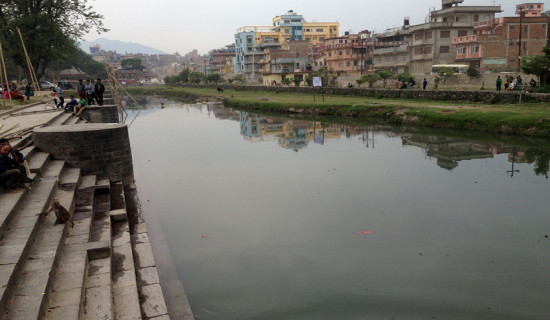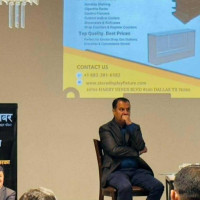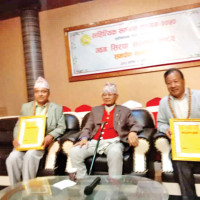- Monday, 27 October 2025
Magar community preserving Naumati Baja in Tehrathum
By Our Correspondent,Tehrathum, July 22: Naumati Baja, a set of traditional Nepali folk instruments, is disappearing.
Due to the impact on other traditional instruments and the inability to preserve the profession of playing these instruments, the Magar community in Sungnam, Tehrathum has started to learn to play the instruments themselves.
As the traditional Naumati Baja, which has resonated since ancient times in royal coronations, weddings, sacred thread ceremonies, worship, and other celebratory events, is on the verge of disappearing, the Magar community of Sungnam, Laligurans Municipality-7, Tehrathum, has started learning to play the instruments themselves.
Bir Bahadur Magar, a resident, said that they have initiated training on the Naumati Baja to ensure there was no shortage of players during weddings and other events as the number of players has been declining.
“Currently, 10 to 12 people are learning,” he said.
Naumati baja consists of two Damahas, two Tyamkos, two Sanais, one Jhyali, and two Narsingas.
Traditionally played by groups of 10 or 11 people, these instruments are now rarely seen.
According to the elderly musicians, playing Naumati Baja was once a livelihood, with marriages and celebrations spanning several days.
Nowadays, marriages are typically a one-day affair, and the tradition of playing these instruments is fading.
One local, Ran Bahadur Magar believes that once villagers learn the skills, they will no longer need to bring instruments from distant places for auspicious events like weddings.
Deuman Nepali of Phedap Rural Municipality -2 Oyakjung said that the reliance on specific ethnic groups to play these instruments has become problematic.
With young people migrating abroad and the elderly passing away, the tradition is vanishing.
He said, “Young people have migrated abroad, and the elderly are dying.”
The instruments that accompany the rhythm of Naumati and Panche Baja are being replaced by modern songs and music.
While there are still some who know how to play these instruments, those who know how to make them are nearly extinct.
It is the responsibility of everyone to take the initiative to preserve this cultural heritage.
If the government shows interest in protecting this tradition, it will help safeguard Nepali art and culture and maintain the essence of Nepaliness, said Nepali.

















